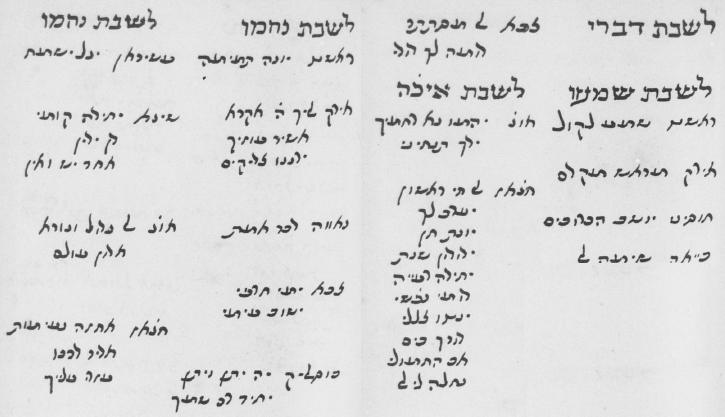

January 12, 2026 ~ Sh VA'ERA. HOSENI / NAWAH
This is the day where we mourn over the destruction of the Bet HaMiqdash. In addition to the reading of Megillat Ekha (Lamentations), there are many sad poems, called Qinot, that are read on this day.
| Section | Pizmon | Page | Song | Commentary | Recordings | Application |
|---|---|---|---|---|---|---|
| 2400 | קינות לתשעה באב | Maqam Hijaz Qinot (sad poems) for Tisha Bab. |
|
|||
| Lamentations | 3008 | L1 | מגילת איכה | Maqam Ajam. Read on Tisha B'Ab. |
G. Shrem G. Shrem M. Kairey Haim Daya Recording Max E Tawil- Full Haim Asriqi, 1911- Ekha 1:1-4 A Zafrani: Haazinu on Tisha B'ab |
|
| Iyob | 3005 | איוב | Ancient undeveloped Rast. Chapter 1-3:1 (narrative) is read like Megillat Ruth. From 3:2 and onwards is read like Iyob. This book is read on Tisha B'Ab. |
|
||
| 4765 | על זאת אספדה אלילה | א״ב. Evening. |
|
קינות | ||
| 4766 | קול אהלה תתיפח |
|
קינות | |||
| 4767 | בורא עד אנה |
|
קינות | |||
| 4768 | כי בעונותינו | Evening. |
|
קינות | ||
| 4769 | עד אנה בכיה בציון | Evening. | קינות | |||
| 4770 | עורה נא ימינך רמה | קינות | ||||
| 4771 | את אויביך אל (בעגלא ובזמן קריב) |
|
קינות | |||
| 4778 | וארץ שפל רומי | קינות | ||||
| 4779 | ירדתי לתחתיות | קינות | ||||
| 4780 | בחדש החמישי | Morning. | קינות | |||
| 4781 | דק ואוג רעשו | קינות | ||||
| 4782 | שכינה צועקת בהרע | קינות | ||||
| 4783 | בת ציון שמעתי | קינות | ||||
| 4784 | מזמור לאסף | Morning. | קינות | |||
| 4785 | עד מתי ה׳ יום זה לעמתך | Morning. | קינות | |||
| 4786 | איכה צאן ההרגה | קינות | ||||
| 4787 | שאי קינה במגינה | קינות | ||||
| 4788 | גרושים מבית תענוגיהם | קינות | ||||
| 4789 | אש תוקד בקרבי | Morning. | קינות | |||
| 4790 | יהודה וישראל דעו מר לי מאד | קינות | ||||
| 4791 | עיני עיני יורדה מים | Morning. | קינות | |||
| 4792 | הרגת ביום אפך | Morning. | קינות | |||
| 4793 | אמרה ציון מצאוני עוני | Morning. | קינות | |||
| 4794 | קצת חנה | This poem is in Arabic. About the story of Hannah and her seven children who were martyred by the king who wanted them to worship idols. | קינות |
| Section | Pizmon | Page | Song | Commentary | Recordings | Application |
|---|---|---|---|---|---|---|
| Hijaz | 588 | 487 | עליון על כל רמים | Shabbat Hazon. Ezra Attia Manuscript Abraham Sitehon Manuscript |
G. Shrem G. Shrem Recording |
נשמת |
| Ajam | 230 | 180 | ראה ה' כי צר לי |
Fule Yanani |
כתר |

Pizmonim selections for Ekha period according to Sassoon Manuscript #647, Aleppo, circa 1850.